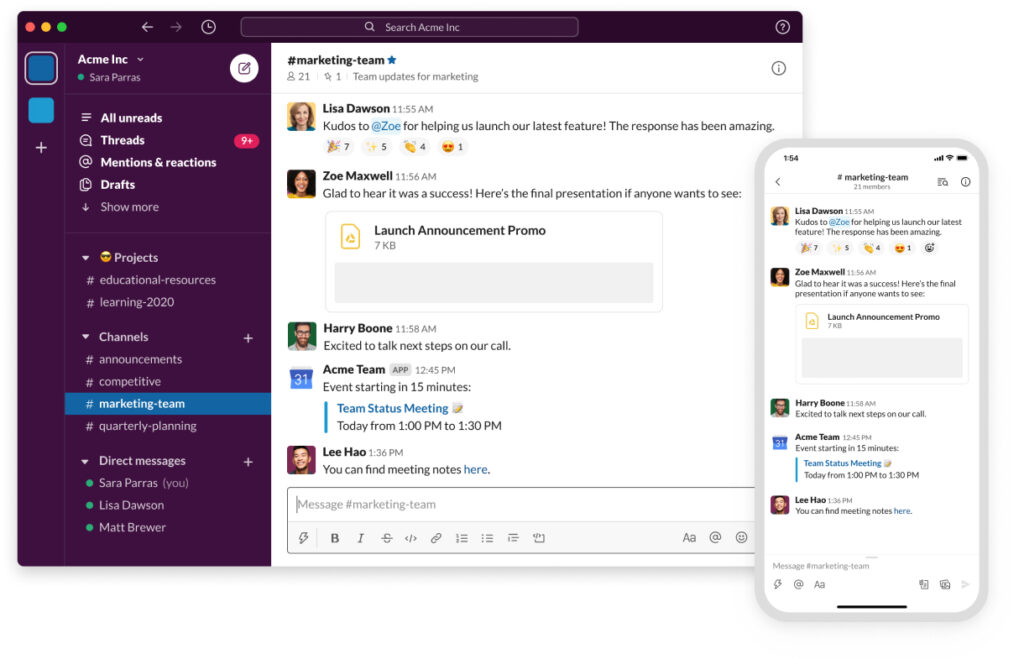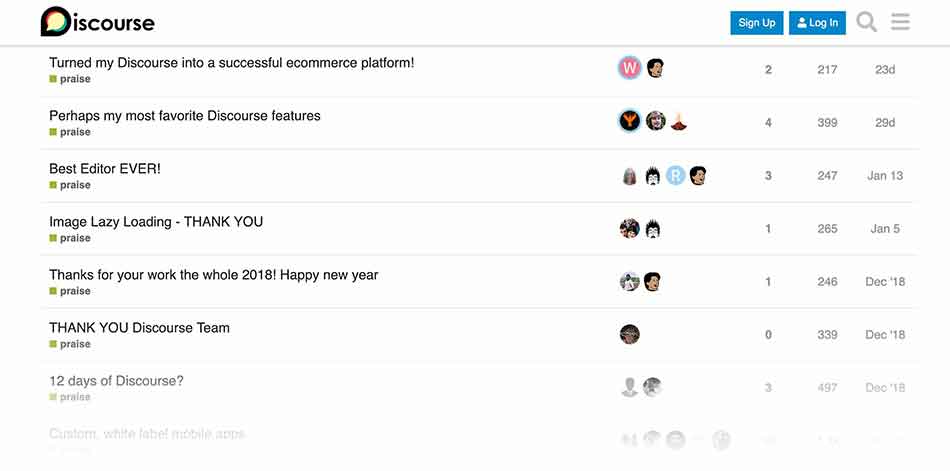In 1934, American essayist Christopher Morley founded a literary society devoted entirely to Sir Arthur Conan Doyle’s Sherlock Holmes novels. The inaugural meeting occurred at the Christ Cella restaurant in New York City, as members gathered to discuss the character, novels, plotlines, and the author himself.
Regular conventions continued throughout the years, setting a precedent for fan communities that would influence groups like the Trekkies, Whovians, Potterheads, and more.
What does that have to do with communities?
Just this: communities of all kinds recognize the need to get together, to create meetings, tools, and methods for maintaining regular communication with one another in order to strengthen the sense of togetherness.
If you want to build a strong community, you need to create a place for members to get together regularly. Fortunately, these days we have numerous robust tools to facilitate conversation, but it’s important to select the tool that works best for your team and community.
By the far the most popular options are chatroom tools like Slack and group forums like Discourse and Vanilla Forums. In this article, I will look at the advantages and disadvantages of each of these, so you can choose the option that works best for you.
Remember, our goal is to provide a simple, sleek, and effective way for your people to connect, one that will offer repeated value for both new and existing users.
The right platform doesn’t merely facilitate communication but enables you to evaluate trends, so you can make informed decisions.
With that in mind, let’s look at the benefits and disadvantages of both Slack and forums.
Slack: Real-Time Discussions

Slack is a popular application that works as a chatroom, enabling team to communicate in groups or in private one-on-one conversations. Available through a website or via a smartphone app, Slack provides a level of flexibility and ease-of-use that has contributed to its widespread use in a broad array of team-based organizations.
There’s a free tier of the software, which only displays the most recent 10,000 messages and limits the number of third-party apps that can be integrated into the program.
There is also a paid plan, priced by the number of active users per month, which removes these limits. Slack even offers a discount for non-profit organizations.
Slack, and similar chat platforms, offers a few distinct advantages when it comes to facilitating teamwork and communication. Let’s look briefly at a couple of them.
1) Real-time Collaboration. When team members need to get quick answers to questions, provide fast updates, or get someone’s attention right away, Slack is the way to go. Individual team members will be notified right away when they receive a message—whether it’s a private one-on-one message or a group message—so they can respond right away.
Real-time discussions go a long way toward creating a sense of teamwork and collaboration, which is especially important when individual team members are geographically scattered.
2) Efficient. Instead of having to juggle emails, text messages, and other forms of communication across a number of platforms, Slack provides a streamlined place for conversations. The interface is simple and easy to use, and you can even attach documents and files to messages. Messaging specific people is as simple as selecting their name from a dropdown menu of team members or tagging them in a message using the @ symbol. There’s also an option for voice or video calls with other team members.
Of course, no platform is perfect, and there are some disadvantages to using Slack for your team collaboration.
Here are some of the most common downsides to consider:
1) Poor Conversation History. While the paid version of Slack saves messages, it doesn’t matter: it can be practically impossible to track down specific conversations. Users can scroll through long conversation chains or search for specific keywords, but it’s clunky and time-consuming. Its far easier to ask people directly, but that requires that they be on-hand to respond. This means you get less reuse of previous content.
2) Time Zones. One of the major selling points of Slack is the ability to have real-time discussions, but this becomes an awkward experience if team members are located across different distant time zones. Since Slack is less robust when it comes to searching for old conversations, this potentially eliminates its primary advantage.
3) App Adoption. For real-time discussion, it’s almost essential that users download the Slack app on their smartphones, but team members may be reluctant to install yet another app for team collaboration, even if the platform is intuitive and easy to use.
4) Difficult to Integrate. Slack is intended to provide one simple solution for all team discussions. Consequently, it doesn’t necessarily integrate well with other communication platforms, such as forums or blog comments (outside of merely referencing other services in Slack.)
5) Lack of SEO. Slack is not designed for search engine optimization, so content isn’t included on Google searches. Therefore, people outside of your group won’t discover you through Slack, which means it isn’t ideal for growing your community.
Ultimately, Slack is an accessible and easy-to-use platform for facilitating team discussions. Its efficiency can help a scattered team feel more unified, fostering a real sense of collaboration. While it’s not perfect, it is one of the better options out there, but you’ll have to decide if it’s right for you.
Forums: Organized and Easy to Search

A forum is an online discussion board (or boards) that enables team members to discuss various topics, ask questions, and participate in group discussions. Discourse and Vanilla Forums are good examples.
Unlike Slack and similar chat channels, forums generally aren’t meant to provide up-to-the-minute conversations or operate like instant messaging.
However, using forums for your team collaboration does provide a few distinct advantages. Let’s look at them briefly.
1) Organized Content. Forums generally provide easy ways to organize content by topic, author, date, and more, which makes it simple to search for previous conversations. This makes it possible to have structured conversations, such as Q&As, and it also greatly increases the reusability of previous posts and conversation threads, turning the forum into a repository of information that can be used as a reference guide.
2) More In-Depth Conversation. The nature of forum posts makes it easier to have in-depth conversations rather than individual chat lines. People can jump in and out of conversations, and look up specific posts. It’s also easier to include quotes, videos, images, and diagrams on a forum post.
3) Excellent SEO. Forum content is generally optimized for search and available on Google, which can serve as a great first step for getting people to join your community. For example, someone searching for specific open-source projects could find your forum posts in search results and navigate there.
4) Good Analytics. Most forums platforms offer robust analytics, so you can see which topics are attracting the most interest. This makes it easier to grow your community by shifting the focus to areas that drive the most participation (see my guide on how to measure forum metrics well.)
Of course, using forums rather than a chat service like Slack also has a few distinct disadvantages. Here are a few of the more notable downsides to using forums for your collaboration:
1) Not Real-Time. While forums can generally be configured to offer post notifications, conversation is generally slower than real-time, with some delay between posts. Depending on your community, this may feel less gratifying when people are trying to work together on an immediate issue.
2) Some look a bit…outdated. Quite frankly, some forum platforms have interfaces that look outdated. The exception here is Discourse: which looks and feels like a much more modern platform (which it is.)
3) Easy to Lose Track. While forums make it easy to have multiple structured conversations on a wide range of topics, it also places a burden on community managers to keep people coming back. It is very easy for forum users to inadvertently drop out of specific threads, which can leave topics or important conversations dangling without resolution.
4) Moderation. With some exceptions (e.g. Discourse), there is often a need for some degree of moderation to prevent spam, off-topic posts, or rude comments.
Which Communication Platform Right for You?
Every community needs some way to have regular conversation in order to feel a sense of collaboration and belonging.
The importance of selecting the right tool to facilitate these conversations can’t be overstated. If team members find it difficult to interact, it can kill the momentum of your community growth.
So, what do I recommend?
If you’re building a large-scale community with a global audience, forums are probably going to work better. They enable your audiences to have structured conversations and collaborate without requiring people to be online at the same time.
Since there’s no requirement for real-time participation in a forum, people across a wide-range of time zones can readily participate. Forums are also better for organizing information, building SEO, and providing support on a much broader scale even as your community continues to grow.
On the other hand, a chat program like Slack works very well for interpersonal communication, which can build a sense of teamwork and friendship on a smaller scale. Asking “How was your weekend?” feels awkward on a forum post, but it’s completely natural on Slack.
Combined with its real-time design, Slack provides a great place for people to spend time together. Even so, a forum will provide a better first port of call for your community members, so they can get up to speed and become familiar with the community at their own pace.
While it’s possible to integrate Slack with your forum, real-time discussion won’t integrate neatly with delayed forum posts, so I personally don’t recommend attempting it. Point community members to your forum for structured conversations, and consider using Slack for informal, real-time communication.
Interested in hearing more about community building? Read more blogs here.








